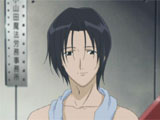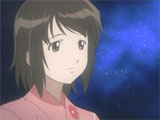

Quick Links:
Someday's Dreamers (Mahou Tsukai ni Taisetsu na Koto)
The presence of magic is not uncommon in Japanese animation. The mahou shoujo subgenre is full of it, of course, as is the typical fantasy series. The irony of magic being everywhere in anime is that after watching enough of these shows, they become decidedly less magical. Sorcery in fantasy shows becomes expected as part of the norm, and whatever "magic" there was in mahou shoujo now seems more often than not like a twisted fashion show for pedophiles. The mistake that most of these shows make is that they take the magic for granted, thereby diluting its ability to enchant the audience. Naturally, there exist series and films that don't fall into this trap. Kiki's Delivery Service was a delightful film, for the simple reason that Kiki's relationship to her magical abilities wasn't ignored. The hilarious side effects of Sae and Co.'s magic use makes Magic User's Club something special. And Someday's Dreamers creates a living, working society of mages and non-mages, with the focus being on the implications of magic use and its place in society.
We learn about the world of Someday's Dreamers through Yume Kikuchi, a young girl with magical abilities. As the series opens, Yume is en route to Tokyo to begin training for mage certification. The certification is a necessity for those who can use magic, and the Bureau of Mage Labor is the governing body responsible for mage actions, all of which require an official request. Yume succeeds in breaking this rule even before reaching her destination - first by raising a few cars off the ground in self defense, and then by dropping a little "present" (a load of cash) on someone that helped her find the right train. Needless to say, instructor Masami Oyamada has his hands full when Yume arrives. The rest of the series follows Yume's discoveries as she learns about herself and the rules of mage actions.
The series effectively limits its scope to positive material, possibly reasoning that a twelve-episode series couldn't show how the society deals with the bad apples without compromising the central plot (which revolves around Yume and her training). As such, a simple letter of apology or short suspension of mage activity absolves the magic users of their unauthorized mage actions - most of which wouldn't even be seen as bad, if not for the fact that they were performed without an official request. Despite the light-hearted feel of the series, it does a good job of capturing the challenges of a mage's life. An example thereof is the perception of magic by those without, namely the idea that a mage should be able to do anything or cure any ill. Also, a mage is often met with a cold reaction when they elect not to use magic, as if their ability is the only thing that makes them useful to society. The way in which Yume meets these challenges goes a long way to show how mages are humans too, complete with feelings and desires.
In accordance with the focus on magic, the series is wonderfully personal. Yume is deeply caring and selfless, constantly thinking of others. She and Oyamada are much alike, so the presence of bartenders Kera and Milinda (Oyamada owns a bar) gives the two mages much-needed relief from their overly introspective personalities. The mage trainee Angela provides a good contrast to Yume. Whereas Yume takes in every word, Angela is more confident in herself, and even a bit selfish at times. The little girl Runa is well-rounded (like Milinda), and serves as a little sister type to Yume. The characters are easy to love, and hard to forget.
As are the character designs. Someday's Dreamers has some of the most beautiful cover art imaginable (courtesy of Kumichi Yoshizuki), and the in-show character art isn't too shabby either. Yume in particular has a charming look - a couple of strands of her hair always sticking straight up as if she's full of static. It's fitting, being that she's a people magnet. The designs of the other characters aren't far out of the ordinary, but they're also not terribly generic. Coupled with animation that flawlessly integrates CG and traditional methods, the visual presentation of Someday's Dreamers is never boring.
I can't exactly say the same for the show's music, however. The bad news is that it is exceedingly repetitive; several tunes being variants of the three main themes. The worse news is that the opening song (Kaze no Hana) - while not bad - seems horribly unfitting to the series. Singer "Hana Hana" has a very deep voice, and her singing on this tune feels reserved, whereas the show is anything but where feelings are concerned. It might have worked out better if Angela was the main character, but it doesn't fit at all with Yume being the center of attention. The good news is: the three main theme songs of the series are wonderful, and the ending theme (Under the Blue Sky, by The Indigo) is even better. Under the Blue Sky fits the open and positive feel of the show perfectly, with its acoustic background and the singer's relaxing voice.
Someday's Dreamers is, without a doubt, a must-see series. Not only does the series paint a realistic picture of a magic-aware culture, but it also tackles difficult concepts like faith and self worth. Magic acts within the show are truly magical, having the mage's personal touch and genuinely enchanting. And the characters' personalities are accessible and easy to relate to. Stealing Yume's tagline for a moment - I recommend this series, "with all my precious feelings."
Note: The Japanese title for this series means, "the most important thing to a magic user." Yume must learn about what is most important to her in order to establish her identity as a mage.
Distributor: Geneon Creator: Norie Yamada / J.C. Staff Released: 2003
Plot: A Character Design: A+ Animation Quality: A+ Music: B+ Overall: A+



